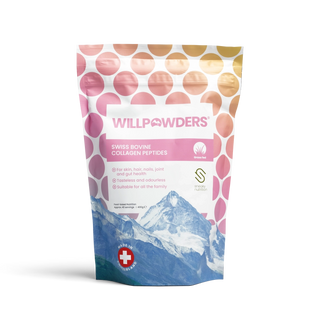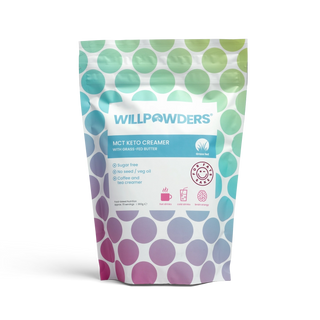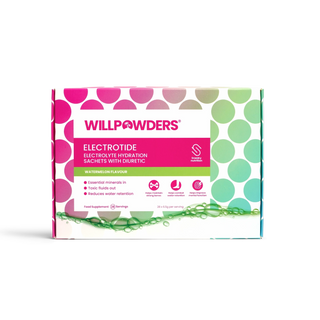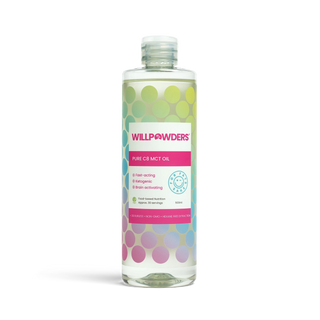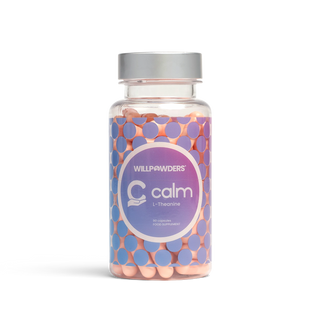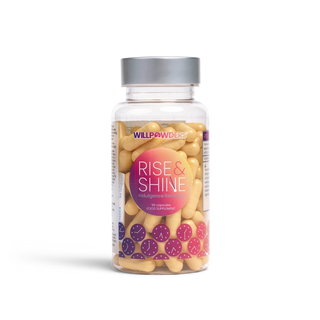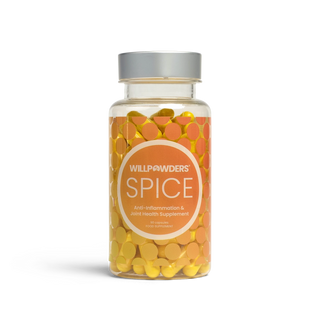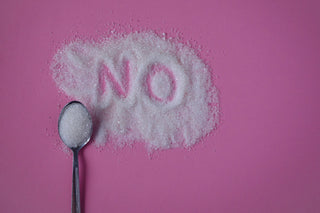
Hack Your Hormones
Just Say No to Protein Powders that Pack That Crack of Spoonfuls of Sugar
Sometimes it’s more a case of what your bone broth protein powder DOESN’T contain. A spoonful of sugar (any -ose will do) shouldn’t belong there, because, if it does, you could be inviting in carbohydrate cravings, the possibility of a dysregulated stress response and, longer term, there may be some serious diseases laying in wait.
It’s easy to sing the praises of bone broth protein powder with grass fed butter.
Here at WillPowders, we are besotted with our take on bone broth protein powders as they can lend themselves to supporting a journey away from the sugar snack attacks as well as providing help towards increasing your intake of quality amino acids in your diet and the host of potential that means for the parts of you that are made from protein - a ballpark figure of between 14 - 16% [1]. Loving those bits of you!
But, the thing is, for us at WillPowders, nurturing wellness and refined sugar, or even seemingly ‘friendly’ unrefined sugars, such as coconut sugar, simply cannot co-exist in an everyday bone broth protein powder. No, siree! And so, those shitty sugars won’t find a home with us.
However, neither will we leave you high and dry through enforced deprivation because we know that your human genome most likely makes you seek out sweetness in your day (a trait exploited by Big Food with hidden and not so hidden sugars at the expense of your health).
When it comes to increasing protein in your diet, and scientists are increasingly reaching the conclusion that we need more than recommended daily amounts than guidelines suggest, you do need varied ways to do this. And it needs to be of quality and, in our stressful lives, that protein needs to be highly palatable because our brains crave highly palatable foods under stress. But nowhere in all the research does it say this means sugar or artificial sweeteners. You see, we do love a fine detail!
So, first, let’s remind you about the fabulous things we do allow into our protein powders and past our discerning lips:
- Bovine bone broth powder - giving your body the potential to recognise the ancient nutrition it was designed for;
- A full amino acid profile - nothing like the full suite to give you the potential to feel tip top;
- Electrolyte macronutrients - to help your body absorb those essentials;
- Grass fed butter - for all the potential Vitamin A, E and K goodies plus Omega 3;
- MCT Keto Creamer to offer your brain ketone fuelling and increased energy expenditure in the making;
- MCT Keto Creamer could also help you feel satiated [2] - so the biscuit jar can do one;
- Natural flavours - they are what they say they are, none of those simulated flavours lurking here;
- A range of flavours from vanilla to chocolate orange and the odd rockstar guest flavour endeavour to satisfy the brain’s hedonistic search for novelty (always thinking, see?);
- Natural stevia sweetness, pinch of Celtic sea salt to offset - trés chef-y!
- Versatility - you can go hot, cold or icy, liquid or creamy, topping or full face plant to keep the texture/temperature novelty going for your pleasure-seeking brain. We wouldn’t judge if you took a bath in it - just send us your story!
- We even did two of our flavours in sachet form so you can shove ‘em in a pocket and travel light! You’re welcome!
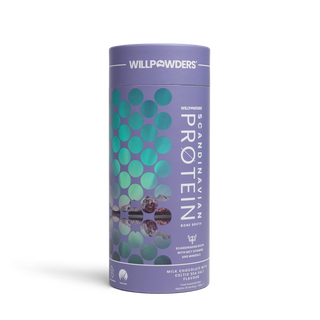

Now, with all that good work in the assembly, carefully thought out and edited ingredients and flavour, why would we add sugar?
Yeah, we wouldn’t. There is absolutely no need. We made sure the -oses like sucrose, glucose, galactose, dextrose, maltose, fructose, and so on, kept their n-oses out! We can neither confirm or deny the words, Do one, sugar tits! were uttered during product development meetings.
So far, so good, then: plenty of macronutrients and amino acids in there and thought given to support against sugar cravings. It’s Nirvana all wrapped up in a mug, pud or general sprinkling, perhaps!
And, for the sake of your potential health, here’s why we did it that way:
- WillPowders Delicious Protein Powders DON’T spike your blood sugar because we use stevia which only creates a gentle blood sugar rise, and so they are far less likely to trigger that body response of needing more carbs later down the line - that’s right, less of that spiky roller coaster nonsense that you get with sugar;
- The aim for our Brilliance Bone Broth Protein Powders is that, as sugar and artificial sweetener free, they DON’T get involved in a diet that could potentially pave the way to the degenerative diseases that science has shown excessive free sugars can herald, according to Harvard Health, triggering conditions such as high blood pressure and lead to chronic inflammation, as well as sugar being involved in triggering other ailments like fatty liver disease which can contribute to cardiovascular disease [3];
- Our Protein Powders WON’T get involved in supporting your brain’s attempt to deal with stress through the ‘analgesic’ of sugar which means you might be allowing the underlying stress ride. We’ve thought more holistically. Say, wait, what? Yup - this one’s worth knowing about! Let’s take you through where science is up to on sugar and stress …


My brain could be trying to deal with my stressful life with sugar?
That’s right! Just when we were all beginning to think it was a flaw in our character, as the media, and public attitude, has often led us to believe, silly, weak us, not being able to stop shovelling in the sugar, along come those delicious boffins to tell us that it might be our brain chemistry overriding our good intentions. Thanks to all the angels in all the realms and cue rousing choral music!
So, the science is experimental at the moment but it goes a little something like this:
- Our friends the lab rats seem to have sparked the idea of the human experiment for the researchers;
- Apparently, the scientists think that sugar consumption in rats ‘may activate a glucocorticoid-metabolic-brain-negative feedback pathway and thereby reinforce habitual sugar overconsumption’ (bear with - we’ll interpret for you!);
- Essentially, under continued stress, cortisol makes the rats want to take on ‘comfort food’, foods that are highly palatable - high fat and high sugar (that sounds like a packet of biscuits by any other name to us - been there, done that!);
- The glucose the brain gets as a result may turn off the stress response temporarily, giving the rats some relief - because even ratties don’t like to feel stressed, just like us, bless;
- But, if the source of the stress isn’t downshifted then ratty seems to continue to want to over consume sugar, the excess of which then gets stored as fat - hello, potential weight gain;
- So, even though there’s now plenty potential stored fuel for ratty in that rather podgier bod, the brain wants ready glucose because the continued cortisol demands it;
- Now ratty’s caught in a seemingly vicious cycle of temporary relief from stress from the glucose and then the comfort food craving returns;
- Right - so maybe that’s why we might also tend to feel the urge to consume carbs when we are under stress?
- Seemingly so as, of the 18 women who were trialled in the experiment, the ones who had the sugary drink rather than the artificial sweetener of aspartame (which we don’t recommend switching to either - count your chemicals and get them to as few as you can as often as you can is the WillPowders Way) had lower cortisol temporarily when they’d consumed that sugary soda;
- This led to the researchers’ experimental findings which were that their work supported ‘a metabolic-brain-negative feedback pathway that is affected by sugar and may make some people under stress more hooked on sugar and possibly more vulnerable to obesity and its related conditions’ [4].
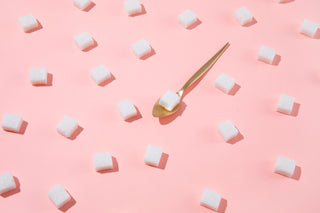

Short term relief from the discomfort of life but long term harm from the sugar substance of choice? Hmmm - sounds like addictive behaviour, doesn’t it?
It’s not a judgement. Anecdotally, it feels like something we’ve certainly experienced. Like, who isn’t under stress these days? Who doesn’t need that feeling to piss off, even if it’s for a little while? Our brains are potentially pushing us towards high fat, high sugar foods. How many of us haven't taken the short term relief from stress that sugar seems to provide, while pushing the long term effects of that seeming analgesic sugar to the back of our minds?
And all the while our bums and tums and thighs and arms and faces slowly accommodate the excess fat on the outside.
And on the inside, the process of lipogenesis to sort out those excess carbs is going on [5], which is designed for this very reason, of course, but with the caveat that it can deal with a reasonable and accommodatable workload, not a constant intake of too much sugar. Similarly, our insulin tries to process the sugars in our blood, again, that’s what it’s supposed to do, but, overtime, this hormone can increasingly start to fail and we can develop insulin resistance. And our liver works harder to process the excess carbs (that the insulin is no longer dealing with) through the process of lipogenesis which could all be the beginnings of fatty liver and cardiovascular disease [3].
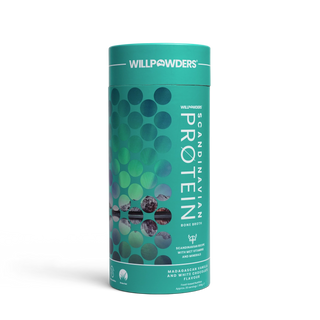

Makes us wonder, why the hell would a company sell you a protein powder, which people take because they may have a vested interest in wellness, casually bob sugar in that mix?
Pass me the amino acids but make sure it comes with a side serving of sugar because I want to play Russian Roulette with the risk of serious diseases, said no one, ever.
And, even when we know all of this, because of that continued stress, we might feel too damned overwhelmed to try to find another way so we might feel, well, sugar it is, then. And besides, we thought one particular protein powder might just turn us into a goddess. Damn! This is too much! Stands to reason we can easily derail our weight and health, right? Even Harvard Health seems to agree [*].
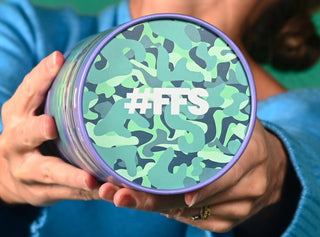

A New WillPowders Way
Hack! Hack! Hack! The more we get ourselves educated about our bodies and don’t take Big Food’s silence on sugar as a green light to eating it, the better we can potentially support these processes that go on in our brains and bodies for the sake of our health! No one here at WillPowders will tell you that the sensation of sweetness can’t be yours:
- We offer you sweetness in the form of stevia so that you experience a palatable taste, afterall, that’s what your brain wants under stress so let’s give it what it wants;
- We offer your body the potential to make ketones from the MCT Keto Creamer we put in there. MCT oil potentially feeds your brain’s stressed need for fuel, acting more like glucose than fat for speedy energy;
- Higher density protein diets tend to mean greater satiation [6] so there’s the chance you’ll be less likely to feel hungry quickly and go seeking a sugar snack.
Make sugarless decisions ...
Empirical evidence amongst you, our customers, suggests that snack cravings are reduced, that the brain does calm down and stops demanding sugar like a tantruming toddler at the checkouts and all those yummy and luxurious eating and drinking experiences are catered for. All without that dreaded S word.
So, if you’re tempted to reach for a protein powder from a company that’s put sugar in there, remember the words every Northern child was told when they were peckish - shit with sugar on! That way, you won’t go far wrong.
WillPowders Protein Powders: no shit, Sherlock, and certainly no sugar on!
Further Reading
- ‘Total body protein (TBPro) accounts for about 14%–16% of BM, that is, ~11 kg in men and 9 kg in women’ [1].
- ‘Within a controlled environment, yes, fats do have an effect on satiety and appear to regulate appetite through several mechanisms including the release of appetite hormones and inhibition of gastric emptying and intestinal transit’ [2].
- ‘In a study published in 2014 in JAMA Internal Medicine, Dr. Hu and his colleagues found an association between a high-sugar diet and a greater risk of dying from heart disease. Over the course of the 15-year study, people who got 17% to 21% of their calories from added sugar had a 38% higher risk of dying from cardiovascular disease compared with those who consumed 8% of their calories as added sugar’ and ‘"Your liver metabolizes sugar the same way as alcohol, and converts dietary carbohydrates to fat," says Dr. Hu. Over time, this can lead to a greater accumulation of fat, which may turn into fatty liver disease, a contributor to diabetes, which raises your risk for heart disease’. [3]
- [4]
- Lipogenesis is explained here [5].
- ‘Protein has the potential to play a key role in several aspects of body weight regulation. The mechanisms by which increased dietary protein regulate body weight are multifactorial. However, taken together, evidence suggests that a moderate increase in dietary protein in association with physical activity and an energy-controlled diet may improve the regulation of body weight by 1) favouring retention or accretion of fat-free mass at the expense of fat mass at a similar physical activity level, 2) reducing the energy efficiency with respect to the body mass regained, and 3) increasing satiety’ [6].
More Blogs

Skin and Bone: Protein or Collagen?
The One Where We Let You Know Why You Need Both Bovine Collagen Peptides and Bone Broth in Your World Optimum well-being is a prime concern. We live in our...

Meet the WillPowders Protein Powders Family
Our Scandinavian Protein Powders are siblings, never twins, so let’s help you decide which you want to enjoy the benefits of, why and when … There’s no greater delight for...

